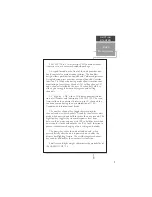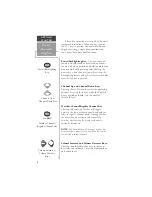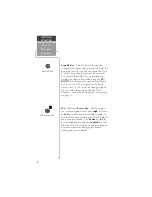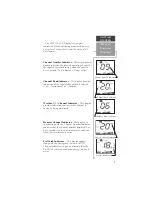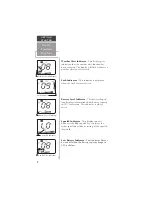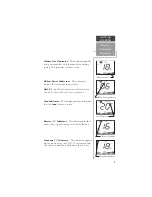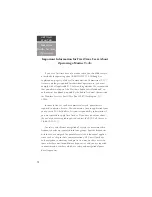
17
GETTING
STARTED
Setting the
Squelch
Threshold
NOTE:
You will notice an A indicator adjacent to
some channel numbers in the USA and Canadian
bands. These are simplex channels (transmitting and
receiving on the same frequency) while the Interna
tional counterpart is a duplex channel (transmitting
on one frequency while receiving on another.)
Setting the Squelch Threshold
S
etting the Squelch is important for reception
of signals you want to hear. There are ten
threshold levels, from 0, which allows all signals
to be received, to 9, which allows only the
strongest signal to be heard through the speaker.
The diagram in Figure 5 demonstrates how setting
the threshold level allows you to hear only the
signals you desire, while weaker, unintelligible
signals are not heard.
To set the Squelch threshold:
1.
Adjust the Squelch to the lowest setting by
pressing and holding the Squelch (
SQ
) key, then
pressing the
DOWN
arrow key repeatedly until the
display indicates L0. You should hear static. If you
hear a voice transmission, change to another
channel and repeat this step.
(Figure 5)
2.
While holding the Squelch (SQ) key down, use the
UP
arrow key to increase the squelch level to L1.
If no static is heard, you have set an acceptable
squelch threshold level. If you hear static, then
increase to the next threshold level, repeating the
process until unwanted static is eliminated.
Release the
SQ
key to return to your selected
channel. The squelch setting is universal for all
channels, but it may require resetting from time to
time
NOTE:
During squelch adjustment, Tri-Watch,
Scan, and Weather Alert are suspended.
1
2
3
4
5
FIGURE 5
EXAMPLE of THRESHOLD
SET AT LEVEL 5
Selected Squelch Level
Up/Down Keys
Only Signals
Stronger Than
Level 5
Will Be Heard
Signal At Level 5
Squelch (SQ) Key

